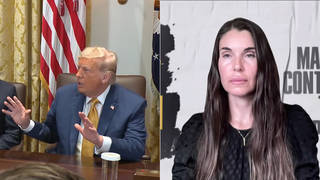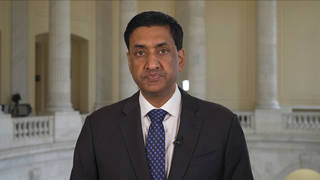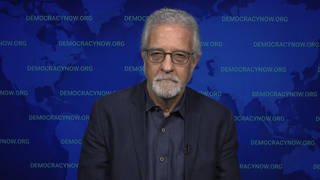
Topics
Guests
- Baher Azmylegal director of the Center for Constitutional Rights and lead counsel for the plaintiffs in the Abu Ghraib lawsuit, Al Shimari v. CACI, et al.
Ten years ago, the shocking photos of U.S. military personnel humiliating and torturing Iraqi prisoners at Abu Ghraib sparked global outcry as well as national hearings, investigations and finger pointing. But many at the center of the Abu Ghraib abuse have never faced a day in court. An attempt to hold the U.S. contractor CACI International accountable could result in the torture victims being held liable for legal fees. In September, a federal court ordered four Iraqis who were imprisoned at Abu Ghraib to pay CACI nearly $14,000 after unsuccessfully suing the company for their torture. In dismissing the initial lawsuit, the judge in the case did not directly address CACI’s role in the abuse, instead citing a U.S. Supreme Court decision restricting lawsuits against corporations for abuses on foreign soil. We are joined by Baher Azmy, legal director of the Center for Constitutional Rights and lead counsel for the plaintiffs in the CACI lawsuit.
Transcript
AMY GOODMAN: For more, we’re joined by Salah Hassan’s attorney, Baher Azmy. He is the legal director of the Center for Constitutional Rights, lead counsel for the plaintiffs in the Abu Ghraib lawsuit. Baher Azmy, thank you so much for being with us. Explain this lawsuit that you have.
BAHER AZMY: After—in 2004, after military investigative reports revealed the role of private military contractors in the atrocities in Abu Ghraib, we actually, with other lawyers, brought three lawsuits against two sets of private military contractors—one on behalf of 256 victims in—which was dismissed by a court of appeals in Washington, a second one against a company called L-3 Services that provided translation services to the U.S. military, and that was brought in Maryland, and that settled on behalf of 71. And this last lawsuit on behalf of Salah and three other victims of torture at the Abu Ghraib hard site against a private military contractor called CACI International, CACI, which provided interrogation services for the U.S. government. And the allegations there, which are based on our own investigation and conclusions of military investigators, is that CACI employees played a central role in the torture and abuse in Abu Ghraib by ordering low-level military military employees to soften up detainees for eventual interrogation by CACI employees. So this lawsuit seeks to hold CACI, the corporate entity, responsible for the actions of its employees.
AMY GOODMAN: I wanted to turn to the Kiobel case. In 2012, the Supreme Court heard oral arguments on whether corporations can be sued in U.S. courts for human rights abuses committed overseas. That case is called Kiobel v. Royal Dutch Petroleum. We spoke to Marco Simons, legal director of EarthRights International, who explained the case’s significance.
MARCO SIMONS: Yeah, so this case is really about whether a corporation that participates in serious human rights abuses, such as crimes against humanity or genocide or state-sponsored torture, can profit from those abuses and shield those profits from the victims when the victims come to take them to court. It’s essentially about whether corporations are immune from any kind of liability for serious human rights abuses worldwide. And that’s what the court of appeals held in this case. They said under no circumstances can a corporation ever be sued for the most serious human rights violations today.
AMY GOODMAN: That’s Marco Simons talking about Kiobel v. Royal Dutch Petroleum Simons is legal director of EarthRights. Can you talk about the significance of this case?
BAHER AZMY: Yeah, so, Kiobel appeared to present the possibility that corporations would be immune for liability under this Alien Tort Statute. But the court pivoted a little bit and instead limited the Alien Tort Statute in a different way, by suggesting that when all of the aspects of the legal claim occur abroad, extraterritorially, courts should not hear those cases. In Kiobel, you had Nigerian plaintiffs, British and Dutch corporations, who alleged that there were crimes against humanity and torture committed in Nigeria, so there were no connections to the United States. And in our case, the district court nevertheless dismissed our case on a kind of narrow—a formalistic reading of the Kiobel decision. But our position in the court of appeals, which recently heard our appeal, is that the Supreme Court recognized that when there are connections to the United States, such as here, where you have a U.S. corporation who entered into contract with the U.S. government and conspired with U.S. military personnel in a U.S.-run prison, the connections to the United States are so strong that U.S. courts have to provide a remedy to foreign nationals for international law violations.
AMY GOODMAN: Former Defense Secretary Donald Rumsfeld claimed he first learned of the extent of the Abu Ghraib abuse after the photographs were made public. This is what he told Congress after the scandal broke in May of 2004.
SECRETARY OF DEFENSE DONALD RUMSFELD: It breaks our hearts that in fact someone didn’t say, “Wait, look, this is terrible. We need to do something to manage the”—the legal part of it was proceeding along fine. What wasn’t proceeding along fine is the fact that the president didn’t know and you didn’t know and I didn’t know. And the—as a result, somebody just sent a secret report to the press, and there they are.
AMY GOODMAN: That’s former Secretary of Defense Donald Rumsfeld. Who has been held accountable for what happened at Abu Ghraib?
BAHER AZMY: Very few people, just a number of low-level military employees, like Charles Graner and Ivan Frederick and some others, who were court-martialed for their role in Abu Ghraib, but no high-level officials. And this suit seeks to hold responsible the corporate entities that conspired with those who were court-martialed and, in some cases, ordered them to undertake the abuse. And that’s a very important feature of this story, the legacy of Abu Ghraib.
AMY GOODMAN: Now, how does Salah’s treatment compare to the other prisoners that you’re representing in this suit?
BAHER AZMY: It’s representative. All of them endured forced nudity. A number of the others endured also electric shocks and sleep deprivation and all forms of sexual humiliation, attacks by guards, physical abuse, a whole constellation of serious mistreatment.
AMY GOODMAN: I want to ask you more about the role of CACI International, as they call themselves—others refer to them as CACI—in Abu Ghraib. First, though, I wanted to go to a clip of the group’s—of the company’s promotional video.
CACI INTERNATIONAL PROMOTIONAL VIDEO: Character. It’s the unique set of moral and ethical qualities that defines who we are. CACI is built on a foundation of character. For 50 years, our defense, homeland security, intelligence and federal civilian customers have depended on CACI for world-leading information solutions. They count on us for our character—honesty, integrity, commitment, respect. Character, it defines who we are.
AMY GOODMAN: That’s an ad from CACI, or CACI. Baher Azmy of CCR?
BAHER AZMY: Well, you know, I don’t have any specific information upon which, you know, they base their claims to sort of ethical behavior. I think a feature of character and sort of ethical behavior would be taking responsibility for the conduct of its employees in Abu Ghraib.
AMY GOODMAN: And what exactly did they do?
BAHER AZMY: Well, so one other—you know, one other data point we have about CACI is, after they successfully dismissed the lawsuit in the trial court, they sought to impose costs against our four torture victims. So, you know, given the massive economic disparity—a multibillion-dollar corporation on the one hand, and four torture victims, three of whom are clearly indigent—that suggests the purpose was simply to deter and intimidate our plaintiffs and other human rights victims from seeking accountability in U.S. courts.
AMY GOODMAN: I wanted to go to Pulitzer Prize-winning journalist Seymour Hersh. In 2004, he broke the story about the abuse and torture of prisoners at Abu Ghraib. Then, in 2010, he revealed U.S. forces were carrying out battlefield executions of prisoners in Afghanistan. This is Hersh speaking during a discussion at the Global Investigative Journalism Conference in Geneva.
SEYMOUR HERSH: And the purpose of my stories was to take it out of the field into the White House, and where it—you know, it’s not that the president or the secretary of defense, Mr. Rumsfeld, or Bush or Cheney—it’s not that they knew what happened in Abu Ghraib; it’s that they had allowed this kind of activity to happen. And I’ll tell you right now, one of the great tragedies of my country is that Mr. Obama is looking the other way, because equally horrible things are happening to prisoners—I mean, to those we capture in Afghanistan. They’re being executed in the battlefield. It’s unbelievable stuff going on there that doesn’t get—necessarily get reported. And things don’t change.
AMY GOODMAN: That was Pulitzer Prize-winning journalist who exposed the My Lai Massacre in Vietnam, Seymour Hersh, and then went on to expose in The New Yorker magazine these photographs of Abu Ghraib, and last week was the 10-[year] anniversary of that exposé.
BAHER AZMY: Well, he brings up a very important point, even about the current administration, which is the lack of accountability across the board for serious human rights violations by current administration officials and former administration officials in Abu Ghraib, in Guantánamo, in Bagram, Kandahar, in secret detention sites. The failure for the Obama administration to seek any kind of meaningful accountability, criminal or civil, is, I think, a deep stain on Obama’s legacy and a critical mistake, as it permits the possibility of repeat conduct and impunity.
AMY GOODMAN: So, what makes you think your case can move forward, since it was dismissed by a lower court?
BAHER AZMY: Well, we’ve—recently, a court of appeals has heard our appeal in Richmond, Virginia. And I think the fact that there are such strong U.S. connections to the torture here, and because the core purpose of the human rights statute we’re relying on, the Alien Tort Statute, is to provide a remedy when U.S. subjects commit international law violations, we’re hopeful that the court of appeals will reinstate the case.
AMY GOODMAN: And the issue of the prisoners having to pay the defense costs?
BAHER AZMY: That’s also on appeal, and we’re hopeful that that will get reversed, as well, when the court reinstates the case.
AMY GOODMAN: If it didn’t get reversed, what happens? How do these men who were formerly imprisoned at Abu Ghraib pay CACI?
BAHER AZMY: Well, they likely can’t pay CACI. They don’t have that kind of money. And so, it remains to be seen what CACI would want to do. But I think—I think their goal here is to send a signal to other people that not only will we not claim responsibility for allegedly unlawful behavior, we’re going to impose costs on you trying to hold us accountable for it.
AMY GOODMAN: Well, Baher Azmy, I want to thank you for being here to talk about this case, the legal director of the Center for Constitutional Rights, lead counsel for the plaintiffs in the Abu Ghraib lawsuit called Al Shimari v. CACI, et al. But I’d like to ask you to stay. When we come back, we’re going to continue to talk about the issue of accountability and the Iraq War with a protest leader at Rutgers University. Condoleezza Rice has just backed out of giving the graduation address at Rutgers because of the protests that took place. Stay with us.













Media Options